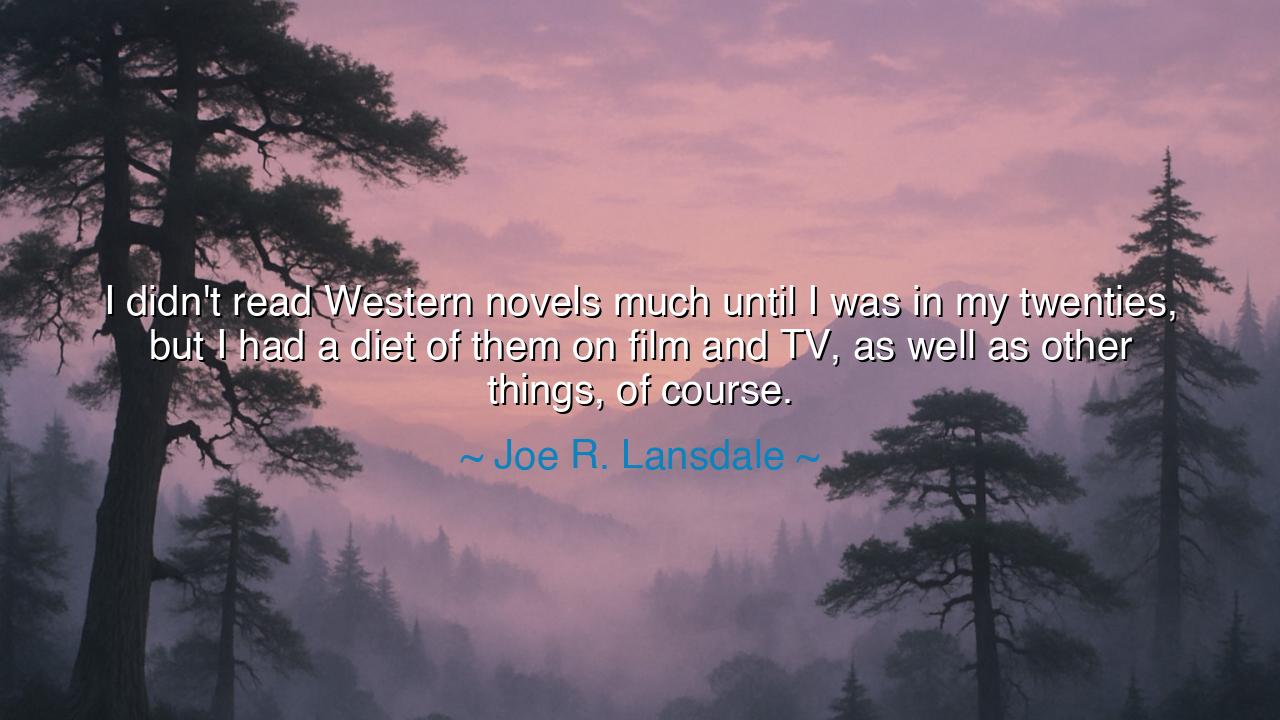
I didn't read Western novels much until I was in my twenties, but
I didn't read Western novels much until I was in my twenties, but I had a diet of them on film and TV, as well as other things, of course.






Listen well, O children of wisdom, to the words of Joe R. Lansdale, who speaks of the quiet, yet powerful influence of culture and storytelling: "I didn't read Western novels much until I was in my twenties, but I had a diet of them on film and TV, as well as other things, of course." These words reveal a truth about the shaping of the soul: our identities, our stories, our very worldview are often nourished not just by the written word, but by the images and sounds that surround us. In this, Lansdale speaks to the power of media, those seemingly passive vessels of culture, that shape the lives of the young and the old alike.
In the ancient world, the great poets and philosophers understood that the stories we consume mold our perceptions, values, and desires. Homer, the poet who wrote the epic tales of the Iliad and the Odyssey, was not merely telling stories for entertainment. His words, carried on the winds of time, shaped the very identity of the Greeks. The values of honor, heroism, and fate woven into his verses became the fabric of an entire civilization’s soul. But just as Homer’s epic was not the only narrative in ancient Greece, so too were the stories of Lansdale’s youth shaped by more than just written novels—they were also fed by the films and television that spoke to the growing generations of their time. Lansdale, like the ancient poets, recognizes that what we feed our minds shapes who we become.
Consider the example of Alexander the Great, whose conquests were guided not only by military prowess but by the stories of his ancestors—heroes whose deeds were immortalized through song, story, and legend. Though he did not read the Western novels as we know them, he was steeped in the ancient tales of gods and warriors that were passed down through oral tradition. The Greek myths, the stories of gods and men, shaped his understanding of himself and his destiny. Alexander, like many of his generation, was not just shaped by the wars he fought, but by the stories he grew up hearing. These stories ignited his ambition and gave shape to his dreams. Lansdale’s experience, though rooted in a different era, mirrors this ancient truth: we are what we consume, in both mind and soul.
In the same way, the culture of Rome was shaped by the stories and ideals passed down through generations. The ancient Romans, from Virgil to Seneca, believed that their culture was rooted in the myths and epics that defined their past. For the Romans, their identity was forged through storytelling. The stories of Aeneas and the founding of Rome were as much a part of their upbringing as the laws and the gods they worshipped. Just as Lansdale grew up consuming the tales of the West, the Romans too were nourished by the stories of their ancestors. The Western genre, with its tales of struggle, survival, and triumph, became for Lansdale a modern reflection of this ancient tradition, reminding us that every civilization’s identity is shaped by the narratives they consume.
But Lansdale also speaks to something deeper: the diet of stories is not limited to the written word, but also to the images we encounter through film and television. The ancient Greeks and Romans, though they had no moving pictures, still consumed stories in the form of theater, sculpture, and painting—forms of visual storytelling that were just as influential as any text. The great tragedies of Sophocles and Euripides were not just plays; they were experiences that brought their audience face-to-face with the moral dilemmas of their time. Similarly, Lansdale points to the way in which film and television become modern-day equivalents of those ancient visual spectacles, shaping and molding the hearts and minds of those who watch them.
In our own time, we are surrounded by a constant diet of media—an unending stream of stories in every form. Much like the heroes of old, we are influenced by the narratives we consume. Lansdale reminds us that the stories we encounter, whether in books, films, or television, shape our worldview, our values, and our very understanding of what it means to live a meaningful life. The challenge, however, is not to passively consume these stories, but to reflect on them, to understand their power, and to choose the narratives that truly elevate our spirit. The ancient wisdom teaches us that stories are not mere distractions; they are blueprints for living.
Therefore, O future generations, let this lesson sink deeply into your hearts: Be mindful of the stories you choose to consume. Whether in novels, films, or television, the narratives you take in shape who you are and how you see the world. Just as Homer shaped the Greeks and Virgil shaped the Romans, so too will the stories of your time shape you. Choose wisely, for the diet of stories you consume will be the foundation of your identity. Seek out stories that challenge you, that inspire you, and that call you to greatness, for it is in the stories we tell ourselves and each other that the true power of civilization lies.






AAdministratorAdministrator
Welcome, honored guests. Please leave a comment, we will respond soon